Can a writer in 19th century foresee what our modern times will be like? The challenges we are faced with, given the turbulent processes that are running below the surface of our current society, may look unique to us at first glance. If you carry on reading the passage below you will realize that there are some common themes and trends in the history of mankind, which could be a result of our innate human nature and cannot be easily dismissed.
Political Ideologies
Current political ideologies constantly assure us that humans are malleable, if only we change our established institutions or improve our welfare, we would become a fully enlightened species, possessing high morals and virtues. What they conceal from us is that there are dark traits in our character that can lead to disastrous consequences on massive scale. Think about the dictatorships of 20th century – both socialistic and nationalistic. The spread of Marxism caused millions people to suffer and die in concentration camps and it was all for the common good, the ideal of the future utopian order was the flag waved before the gullible masses.
In his novel Crime and Punishment the main protagonist lives in miserable conditions but his intellectual capacity is far beyond his contemporaries. He dropped from university due to his dire financial situation and is forced to give his watch, received for graduation to a greedy pawnbroker – an old lady. Razkolnikov starts asking himself what if he kills the lady and uses the money to finish his education? After all, morals is just for people that are too afraid to take the risks, there is no objective truth that holds you from doing what is prohibited. Notice here there are multiple themes, intertwined in the book which remind us of Nietzsche and also of the socialistic revolutions. Everything is permitted if it is for the common good, or complies with the current prevailing values.
Rationalism and Atheism
Dostoyevski deals with the eternal questions and the quest for truth in many of his books, especially in “Idiot” and “Brothers Karamazov”. Proving that he is a real intellectual he tries to juxtapose both the strongest arguments for the existence of god and against religion. Does it sound familiar? The modern atheists claim that God is dead, somehow echoing the Nietzsche’s observation. The real debate is ongoing because if we remove the belief in a superior being we might end up with unpleasant reality. Think about it, eugenics and racial theories have their basis in Darwinism and strictly materialistic view of the world, not by chance. In Dostoyevski’s mind we as humans are capable of committing crimes beyond imagination and can be as cruel as beasts. Despite all the flaws we have, the author is optimistic about our potential. He alludes that belief in God or a force that transcends us can enhance our society and lead us to a better path.
The post is too simplistic to present all the complex ideas that can be found in Dostoyevski’s novels. I hope you get interested and read some of his marvelous works.
“If someone proved to me that Christ is outside the truth and that in reality the truth were outside of Christ, then I should prefer to remain with Christ rather than with the truth.”

A Russian born American novelist Ayn Rand, whose parents migrated to California USA to escape the Bolshevik revolution in Russia wrote the novels Fountain Head (1948) and Atlas Shrugged (1953). In these two novels Ayn Rand was telling us about the characters attitude and success story in a democracy or when “everything is permitted” (by Dostoevsky).